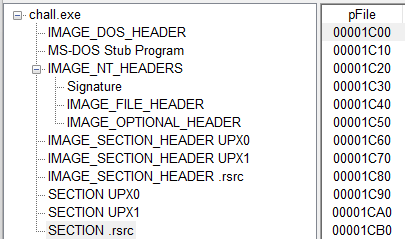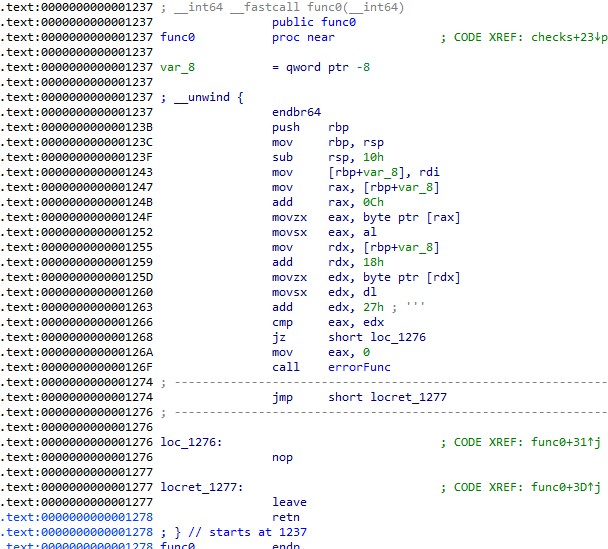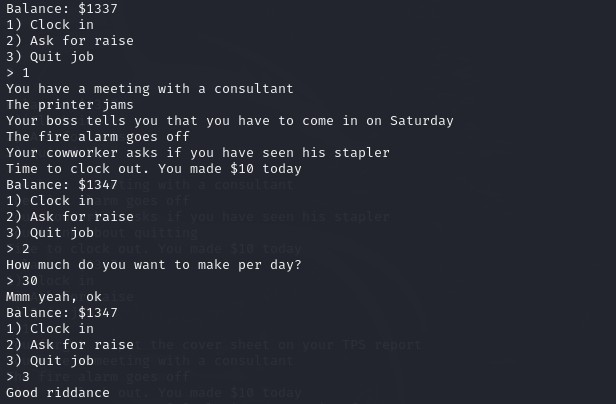나른하던 일요일 오후, 선배에게 카톡 한 통을 받았다.

12시까지 잠들지 않으면 월요병 증세가 심해지므로… 자체 6시간 타임 리밋 CTF 렛츠고

| Problem | Type | Remarks |
|---|---|---|
| Passwords |
Forensics
|
KeePass Database Brute-Force |
| CrackMeEXE |
Reversing
|
UPX Unpacking |
| AngerIssues |
Reversing
|
Symbolic Condition Extraction |
| Office |
Reversing
|
Bitmask based balance manipulation |
Passwords
kdbx 파일 1개가 주어진다. kdbx는 KeePass라는 비밀번호 관리 프로그램의 데이터베이스 파일 형식이다. 내용을 바로 열람 가능할 수도 있지만 보통 데이터베이스 암호화 해제를 위한 마스터 키가 필요하다.
└─$ file Database.kdbx
Database.kdbx: Keepass password database 2.x KDBX
PoC
keepass2john으로 해시를 덤프하고, 이를 brute-force attack 하여 쉽게 마스터 키를 얻을 수 있었다.
┌──(kali㉿kali)-[~/Desktop]
└─$ keepass2john Database.kdbx > hash.txt
┌──(kali㉿kali)-[~/Desktop]
└─$ john hash.txt --wordlist=/usr/share/wordlists/rockyou.txt
Using default input encoding: UTF-8
Loaded 1 password hash (KeePass [SHA256 AES 32/64])
Cost 1 (iteration count) is 6000 for all loaded hashes
Cost 2 (version) is 2 for all loaded hashes
Cost 3 (algorithm [0=AES 1=TwoFish 2=ChaCha]) is 0 for all loaded hashes
Will run 4 OpenMP threads
Press 'q' or Ctrl-C to abort, almost any other key for status
goblue1 (Database)
1g 0:00:00:36 DONE (2025-03-23 03:52) 0.02758g/s 2459p/s 2459c/s 2459C/s gobucks1..giana
Use the "--show" option to display all of the cracked passwords reliably
Session completed.
┌──(kali㉿kali)-[~/Desktop]
└─$ john --show hash.txt
Database:goblue1
1 password hash cracked, 0 left
아래와 같이 데이터베이스 내 주요 필드를 출력하여 Flag를 찾을 수 있다.
from pykeepass import PyKeePass
kp = PyKeePass('Database.kdbx', password='goblue1')
for entry in kp.entries:
print(f"[{entry.title}]")
print(f" Username: {entry.username}")
print(f" Password: {entry.password}")
print(f" Notes: {entry.notes}")
print()
[Sample Entry]
Username: User Name
Password: Password
Notes: Notes
...
[flag]
Username: the flag
Password: wctf{1_th0ught_1t_w4s_s3cur3?}
Notes: :3
CrackMeEXE
exe 파일 1개가 주어진다. 실행 시 올바른 패스워드 입력을 요구한다.

UPX Unpacking
IDA에 문제 파일을 로드하자 IAT 로드 관련 에러가 발생하였다.

때문에 PE 구조를 확인해보니 UPX 패킹이 되어 있었다.

그렇다면 언패킹을 한 뒤 IDA에 다시 올리면 된다.
$ upx -d chall_unpack.exe
Ultimate Packer for eXecutables
Copyright (C) 1996 - 2024
UPX 4.2.2 Markus Oberhumer, Laszlo Molnar & John Reiser Jan 3rd 2024
File size Ratio Format Name
-------------------- ------ ----------- -----------
12289 <- 8705 70.84% win64/pe chall_unpack.exe
Unpacked 1 file.
PoC
디버거 체크 로직 2개 if ( ((__int64 (*)(void))IsDebuggerPresent)() )와 !((unsigned int (__fastcall *)(__int64, int *))CheckRemoteDebuggerPresent)(v15, &v24)만 잘 우회하면 비밀번호 체크 로직인 v22 = v16(Buffer);로 진입할 수 있다. 디버거 체크 로직은 로직 실행 후 rax와 v24(stack) 값을 적절히 바꾸어 주는 것으로 간단히 우회 가능하다.
int __fastcall main(int argc, const char **argv, const char **envp)
{
...
if ( ((__int64 (*)(void))IsDebuggerPresent)() )
{
puts("Nice try");
exit(-1);
}
v13 = v12();
v14 = ((__int64 (__fastcall *)(__int64, _QWORD, _QWORD))OpenProcess)(0x1FFFFFLL, 0LL, v13);
v15 = v14;
if ( !v14 )
return -1;
v16 = (__int64 (__fastcall *)(char *))((__int64 (__fastcall *)(__int64, _QWORD, __int64, __int64, int))VirtualAllocEx)(
v14,
0LL,
139LL,
12288LL,
4);
if ( !v16 )
return -2;
srand(0x3419u);
v18 = 0;
v19 = &unk_7FF618405080;
do
{
*v19 ^= rand();
++v18;
++v19;
}
while ( v18 < 0x8B );
if ( !((unsigned int (__fastcall *)(__int64, __int64 (__fastcall *)(char *), void *, __int64, char *))WriteProcessMemory)(
v15,
v16,
&unk_7FF618405080,
139LL,
v25) )
return -3;
if ( !((unsigned int (__fastcall *)(__int64, __int64 (__fastcall *)(char *), __int64))VirtualProtectEx)(
v15,
v16,
139LL) )
return -4;
puts("What is the password?\n");
if ( !((unsigned int (__fastcall *)(__int64, int *))CheckRemoteDebuggerPresent)(v15, &v24) )// v24 needs patch : 1->0 , not rax!!
return -5;
if ( v24 )
{
puts("NO CHEATING");
exit(-1);
}
v27 = 0;
*(_OWORD *)Buffer = 0LL;
v20 = _acrt_iob_func(0);
fgets(Buffer, 19, v20);
v21 = strcspn(Buffer, "\n");
if ( v21 >= 0x14 )
_report_rangecheckfailure();
Buffer[v21] = 0;
v22 = v16(Buffer);
v23 = "\nCORRECT!";
if ( v22 )
v23 = "\nWhat? no...";
puts(v23);
return 0;
}
우회 후 체크 로직에 진입하면, v4, v5 값을 활용한 간단한 XOR 연산으로 비밀번호를 체크하는 로직임을 확인 가능하다.
__int64 __fastcall sub_1CEB7450000(__int64 buffer)
{
__int64 i; // r10
__int64 v3; // rdi
_QWORD v4[4]; // [rsp-28h] [rbp-28h] BYREF
__int64 v5; // [rsp-8h] [rbp-8h] BYREF
for ( i = 0LL; *(_BYTE *)(buffer + i); ++i )
;
if ( i != 18 )
return 1LL;
v5 = 1734437990LL;
v4[3] = &v5;
v4[2] = 4441LL;
v4[1] = 0x1352353903521556LL;
v4[0] = 0x90F2D1D01150F11LL;
v3 = 0LL;
while ( i )
{
v3 += *((_BYTE *)v4 + i - 1) != (unsigned __int8)(*((_BYTE *)&v5 + (i - 1) % 4uLL) ^ *(_BYTE *)(buffer + i - 1));
--i;
}
return v3;
}
아래와 같이 역연산 코드를 짜 flag를 구할 수 있다.
import struct
# v4 데이터 (총 32바이트)
v4_bytes = (
struct.pack("<Q", 0x90F2D1D01150F11) + # v4[0]
struct.pack("<Q", 0x1352353903521556) + # v4[1]
struct.pack("<Q", 4441) + # v4[2] (4B 유효)
struct.pack("<Q", 0x0) # dummy for alignment
)
v5 = struct.pack("<I", 0x67616C66)
password = b""
for i in range(18):
expected = v4_bytes[i]
mask = v5[i % 4]
password += bytes([expected ^ mask])
print("Recovered password:", password.decode('latin1'))
AngerIssues
ELF 한 개가 주어지며, 실행 시 적절한 60자 입력을 요구한다.
int __fastcall main(int argc, const char **argv, const char **envp)
{
printf("Enter the secret string: ");
fgets(input, 60, stdin);
checks((__int64)input);
puts("Yay! You did it!");
return 0;
}
입력값 체크 로직 형태를 보면 내면에서 잠시 Anger Issue가 발생한다.
__int64 __fastcall checks(__int64 a1)
{
base(a1);
func0(a1);
func1();
func2(a1);
func3(a1);
func4(a1);
func5(a1);
func6(a1);
func7(a1);
func8(a1);
func9(a1);
func10(a1);
...
func232(a1);
func233(a1);
func234(a1);
func235(a1);
func236(a1);
func237(a1);
func238(a1);
return func239(a1);
}
Approach
다행히 각 func 형태가 복잡하지 않으므로, 금새 Anger Issue를 가라앉힐 수 있었다. 분노조절잘해
__int64 __fastcall func0(__int64 a1)
{
__int64 result; // rax
result = (unsigned int)*(char *)(a1 + 12);
if ( (_DWORD)result != *(char *)(a1 + 24) + 39 )
errorFunc();
return result;
}
대부분의 func는 위와 같이 array[a1] == array[a2] + a3 형태이거나 아무 내용도 담고 있지 않다. 분석을 위해 어셈블리를 보면 아래와 같다. 형태가 일정하므로, IDA python 스크립트를 활용하여 각 func{n}으로부터 array[a1] == array[a2] + a3의 a1, a2, a3를 추출하는 쪽으로 문제 풀이 방향을 설정하였다.

PoC
각 func{n} 심볼로부터 함수의 주소 값을 파악하고, array[a1] == array[a2] + a3의 a1, a2, a3를 추출하는 IDA Python 코드이다.
from idautils import *
from idc import *
def parse_func_offsets(ea):
insts = list(FuncItems(ea))
reg_map = {} # 레지스터가 기준 주소를 가리키고 있는지 (e.g., a1)
mem_reads = {} # 레지스터가 메모리에서 어떤 오프셋을 읽었는지
result = None
for i in insts:
mnem = print_insn_mnem(i)
if mnem == "mov" and "[rbp+var_8]" in print_operand(i, 1):
reg = print_operand(i, 0)
reg_map[reg] = 0
elif mnem == "add":
reg = print_operand(i, 0)
val = get_operand_value(i, 1)
if reg in reg_map:
reg_map[reg] += val
elif reg in mem_reads:
prev = mem_reads[reg]
if isinstance(prev, tuple):
offset, const = prev
else:
offset, const = prev, 0
mem_reads[reg] = (offset, const + val)
elif mnem == "sub":
reg = print_operand(i, 0)
val = get_operand_value(i, 1)
if reg in mem_reads:
prev = mem_reads[reg]
if isinstance(prev, tuple):
offset, const = prev
else:
offset, const = prev, 0
mem_reads[reg] = (offset, const - val)
elif mnem in ["movzx", "movsx"]:
dst = print_operand(i, 0)
src = print_operand(i, 1)
if "byte ptr" in src:
for reg, offset in reg_map.items():
if reg in src:
mem_reads[dst] = offset
elif mnem == "cmp":
op1 = print_operand(i, 0)
op2 = print_operand(i, 1)
def resolve(op):
if op in mem_reads:
val = mem_reads[op]
if isinstance(val, tuple):
return val
else:
return (val, 0)
return None
val1 = resolve(op1)
val2 = resolve(op2)
if val1 and val2:
offset1, const1 = val1
offset2, const2 = val2
result = (offset1, offset2, const2 - const1)
break
return result
def parse_all_funcs():
results = []
for i in range(240):
name = f"func{i}"
ea = get_name_ea_simple(name)
if ea == BADADDR:
print(f"[!] {name} not found.")
continue
res = parse_func_offsets(ea)
if res:
print(f"[+] {name}: {res}")
results.append((name, *res))
else:
print(f"[-] {name}: no match")
return results
parse_all_funcs()
추출 결과를 conditions.txt에 저장한 다음, z3을 이용하여 조건을 만족하는 입력값을 알아내었다.
from z3 import *
def parse_conditions_from_file(filename):
conditions = []
with open(filename, 'r') as f:
for line in f:
if line.startswith("[+]"):
try:
parts = line.split(":")
values = parts[1].strip().strip("()").split(",")
a1, a2, a3 = map(int, values)
conditions.append((a1, a2, a3))
except:
continue
print(f"[+] Parsed {len(conditions)} conditions")
return conditions
def solve_with_z3(conditions):
max_index = max(max(a1, a2) for a1, a2, _ in conditions)
max_index = max(max_index, 42) + 1
array = [Int(f'array_{i}') for i in range(max_index)]
s = Solver()
# 바이트 범위 제한
for b in array:
s.add(b >= 0, b <= 255)
# 조건들 추가
for a1, a2, a3 in conditions:
s.add(array[a1] == array[a2] + a3)
# 초기 조건 (wctf, 마지막 문자 == 'w')
s.add(array[0] == 119) # 'w'
s.add(array[1] == 99) # 'c'
s.add(array[2] == 116) # 't'
s.add(array[3] == 102) # 'f'
s.add(array[42] == array[0]) # array[42] == 'w'
if s.check() == sat:
model = s.model()
flag_bytes = [
model.evaluate(byte, model_completion=True).as_long()
for byte in array
]
print("[+] Flag bytes:")
print(flag_bytes)
print("[+] As characters:")
flag_str = "".join(chr(b) if 32 <= b <= 126 else "." for b in flag_bytes)
print(flag_str)
return flag_str
else:
print("[-] No solution found.")
return None
if __name__ == "__main__":
conditions = parse_conditions_from_file("conditions.txt")
solve_with_z3(conditions)
Office
ELF 1개가 주어진다. 실행 시 가상 Office에 출근하여 일당을 받거나, 일당 인상을 요구하거나, 사직할 수 있다.

Approach
실행 하였을 때 파악한 로직과 동일하게, 사용자에게 3가지 옵션이 주어진다.
void __fastcall __noreturn main(__int64 a1, char **a2, char **a3)
{
char s[3]; // [rsp+1h] [rbp-Fh] BYREF
unsigned int v4; // [rsp+4h] [rbp-Ch]
FILE *stream; // [rsp+8h] [rbp-8h]
sub_40149A(a1, a2, a3);
stream = fopen("/dev/urandom", "r");
if ( !stream )
{
puts("Cannot open /dev/urandom");
exit(1);
}
fread(&initial_balance, 1uLL, 1uLL, stream);
fclose(stream);
temp_balance = initial_balance;
while ( 1 )
{
do
{
print_selections();
fgets(s, 3, stdin);
*__errno_location() = 0;
v4 = strtol(s, 0LL, 10);
}
while ( *__errno_location() );
if ( v4 == 3 )
print_flag();
if ( v4 > 3 )
break;
if ( v4 == 1 )
{
clock_in();
}
else
{
if ( v4 != 2 )
break;
raise();
}
LABEL_14:
if ( balance <= 0 )
{
puts("You can't even spend money and yet you lost it all. You're fired.");
exit(0);
}
}
printf("choice: %d\n", v4);
goto LABEL_14;
}
1. clock_in 시 발생하는 이벤트가 완전 랜덤이 아닌, 잔고와 관련하여 연산된 값에 의존하여 발생한다. 참고로 byte_40408n 값들은 모두 특정 값이 정해져 있다.
__int64 clock_in()
{
__int64 result; // rax
if ( ((unsigned __int8)temp_balance & (unsigned __int8)byte_404088) != 0 )
puts("You forget to put the cover sheet on your TPS report");
if ( ((unsigned __int8)temp_balance & (unsigned __int8)byte_404089) != 0 )
puts("You have a meeting with a consultant");
if ( ((unsigned __int8)temp_balance & (unsigned __int8)byte_40408A) != 0 )
puts("The printer jams");
if ( ((unsigned __int8)temp_balance & (unsigned __int8)byte_40408B) != 0 )
puts("Your boss tells you that you have to come in on Saturday");
if ( ((unsigned __int8)temp_balance & (unsigned __int8)byte_40408C) != 0 )
puts("The fire alarm goes off");
if ( ((unsigned __int8)temp_balance & (unsigned __int8)byte_40408D) != 0 )
puts("Your cowworker asks if you have seen his stapler");
if ( ((unsigned __int8)temp_balance & (unsigned __int8)byte_40408E) != 0 )
puts("You think about quitting");
printf("Time to clock out. You made $%d today\n", (unsigned int)clock);
balance += clock;
result = balance ^ (unsigned int)(unsigned __int8)temp_balance;
temp_balance ^= balance;
return result;
}
3. quit job 선택 시 현재 잔고가 초기 잔고의 257배일 경우 플래그를 출력하는 히든 이벤트(?)가 있다. 그러므로 option 1과 2를 적절히 활용하여 balance를 initial_balance의 257배로 조정 후 option 3를 선택하면 되겠다. 유일한 문제는 initial_balance가 random하게 결정된다는 점이다.
void __noreturn print_flag()
{
char ptr[56]; // [rsp+0h] [rbp-40h] BYREF
FILE *stream; // [rsp+38h] [rbp-8h]
if ( 257 * (unsigned __int8)initial_balance == balance )
{
stream = fopen("./flag.txt", "r");
if ( !stream )
{
printf("Cannot open ./flag.txt");
exit(1);
}
fread(ptr, 0x20uLL, 1uLL, stream);
ptr[32] = 0;
puts("You were actually nice to have around");
puts("Here, take this parting gift:");
puts(ptr);
exit(0);
}
puts("Good riddance");
exit(0);
}
PoC
Option 1에서 temp_balance와 XOR 연산한 결과에 따라 이벤트를 출력하므로, option 1을 선택할 때마다 현재 temp_balance의 조건을 알 수 있다. 반복적으로 option 1을 선택하면서, 이외 기타 연산을 적절히 처리하면 initial_balance를 알 수 있다. 이후엔 initial_balnce의 257배까지 남은 금액을 clock_in으로 요청하면 된다.
from pwn import *
def check_candidates(candidates,out):
bitmask_table = {
"cover sheet": ("You forget to put the cover sheet", 0x0A),
"consultant": ("You have a meeting with a consultant", 0x16),
"printer": ("The printer jams", 0x18),
"saturday": ("Your boss tells you that you have to come in on Saturday", 0x28),
"fire alarm": ("The fire alarm goes off", 0xA8),
"stapler": ("Your cowworker asks if you have seen his stapler", 0x60),
"quitting": ("You think about quitting", 0x01),
}
for label, (msg, bit) in bitmask_table.items():
if msg in out:
candidates = [i for i in candidates if (i & bit) != 0]
else:
candidates = [i for i in candidates if (i & bit) == 0]
return candidates
def xor_update(candidates,balance):
candidates = [i^balance for i in candidates]
return candidates
def calculate_goal(candidates, balance):
candidate = candidates[0]
while True:
candidate ^=balance
balance -=10
if balance ==1337:
break
goal = 257 * candidate
return goal
if __name__=='__main__':
p = remote("office.kctf-453514-codelab.kctf.cloud", 1337)
balance = 1337
candidates = [i for i in range(256)]
out = p.recvuntil(b"> ")
print(out.decode(errors='ignore'))
while True:
print("-------------")
print(candidates)
if len(candidates)==1:
break
p.send(b"1\n")
out = p.recvuntil(b"> ")
print(out.decode(errors='ignore'))
candidates = check_candidates(candidates,out.decode(errors='ignore'))
balance += 10
candidates = xor_update(candidates,balance)
goal = calculate_goal(candidates,balance)
print(balance)
left = goal-balance
print("[send 2]-----------------------")
p.send(b"2\n")
out = p.recvuntil(b"> ")
print(out.decode(errors='ignore'))
print(f"[send left {left}]-----------------------")
p.sendline(bytes(str(left), "utf-8"))
out = p.recvuntil(b"> ")
print(out.decode(errors='ignore'))
print("[send 1 again]-----------------------")
p.send(b"1\n")
out = p.recvuntil(b"> ")
print(out.decode(errors='ignore'))
print("[send 3]-----------------------")
p.send(b"3\n")
out = p.recvall(timeout=2)
print(out.decode(errors='ignore'))